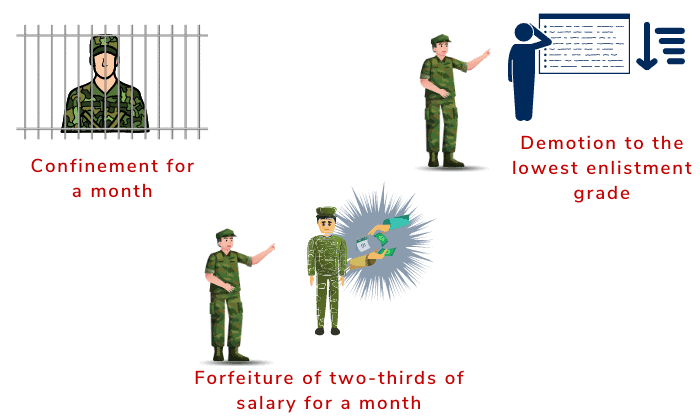The war zone and other military fields can be taxing for the mind and body. No matter how difficult it might be, you shouldn’t leave your job without permission, or you’ll risk more serious consequences. So, what happens if you go AWOL?
If you commit an AWOL status, you can face a reduction of rank, salary cuts, and confinement. An absence of more than 30 days is even more severe as you can face longer jail time, forfeiture of all benefits, and a dishonorable discharge.
Continue reading to know the definition of AWOL, its types, and its corresponding consequences.
Table of Contents
What is AWOL?
The acronym AWOL means absent without leave in the army. It’s also known as unauthorized absence (UA) in the Navy and Marine Corps. No matter the reasons, it’s a violation of the Uniform Code of Military Justice (UCMJ) under Article 86 and can result in dire consequences.
A serviceman is considered AWOL when leaving the military without permission. For example, you leave your spot at 4 PM even when you’re supposed to clock out at 6 PM. Failing to report to your duty at a specified time and overstaying your leave for more days are also considered AWOL.
You can face serious consequences if AWOL is proven true. Hence, you must get proper permission or authorization when you can’t attend your duty.
Types of Absence Without Leave
Certain elements must be proven true before a service member is deemed AWOL under the law. For all we know, the soldier didn’t just know his schedule. Here are the elements for each specific type of absence.
- Failure To Report To Appointed Place: A soldier goes AWOL if they know of the time and place of work appointed by the Command but still don’t show up without permission.
- Leaving The Place Of Work: You violate the AWOL regulations when you know of the appointed place and time of work but still leave the area without authorization.
- Absence From Work: Be careful when you file a leave from work. Without permission from your Commander, it’s still considered AWOL.
- Abandoning Watch Or Guard: A member in the national guard commits AWOL if they’re absent from their active duty without permission. It’s even more true if the accused has the intention to abandon his work.
- Absence To Avoid Field Activities: A person is considered AWOL if they got absent during basic training without authority.
When you go AWOL for 30 days, the offense becomes desertion automatically. This act is more illegal than AWOL status because it has the intent to be away from the job permanently—this is the distinction between AWOL and desertion.
Penalties for desertion are harsher, which include longer jail time, dishonorable discharge, and even the death penalty for deserters during the war.
Consequences And Penalties of Going AWOL
AWOL charges may depend on the discretion of the Commander, but the immediate consequences are confinement and forfeiture of salary. If you’ve gone AWOL for fewer than 3 days, you can expect:
- Confinement for a month
- Demotion to the lowest enlistment grade
- Forfeiture of two-thirds of salary for a month.
If you’re absent for more than three days but less than a month, then you’ll get confined for six months, demoted to the lowest rank, and lose two-thirds of your salary for six months.
A soldier may face more grave consequences when the days of absence are more than 30 days. They can face a dishonorable discharge, demotion, and 12–18 months of confinement. The worst of it all is the suspension of all allowances and salaries.
One great example is the Linley Lemburg case, wherein he was caught by the officials after going AWOL from the Air Force in 1972. After pleading guilty to desertion, the military judge sentenced him to a dishonorable discharge, demotion, and 15-year confinement.
Effects on Personal Life
Going AWOL in the military is never a wise move. It can hurt you emotionally, mentally, and financially.
Since you know the repercussions of your misdemeanor, you’ll live a life of anxiety. There’s always that fear that someone can catch you anytime. Your reputation is also on the line because you’ll be known as someone who abandoned his duty—an action that can make you come across as untrustworthy.
Once you’re apprehended, you face several cuts in your pay and, worse, forfeiture of all your benefits. Hiring a lawyer is another financial burden, plus the waste of time and energy in going to court until you get your sentence.
Tips to Know If You’re AWOL
If you want to avoid the consequences of going AWOL, here are some things you can do.
- Return to your assigned unit and report to your Commander immediately. You don’t want to extend the days of absences, or else you’ll get desertion status.
- If your misdemeanor is due to a valid reason, present your proof to achieve a more lenient sentence.
- Consider seeking the help of a lawyer who specializes in this type of military case.
Prevention And Support
Many reasons drive a service member to go AWOL, including personal problems, fear, and mental weakness. To reduce the rate of AWOL cases, it’s best to address the issues of soldiers.
When a soldier wants to quit, a discharge should be properly provided. Military men resort to choosing AWOL to leave the army on their own accord. Give them what they need, including overseas assignments and leave extensions.
Better treatment of military personnel can also improve their well-being and mindset. If there are any administrative problems, correct that and provide necessary adjustments to newbie soldiers in the field.
Options and resources for individuals considering AWOL
Before resorting to going AWOL, why not take your time to think things through? Here are a few alternatives you should consider:
- Seek support from your loved ones. Tell them your issues; they may be able to provide some outsider insight that will solve your dilemma.
- Speak with your Commander or counselor. Both of them can provide guidance on the situation, helping you see how to handle your situation.
- Try asking for a transfer to a different base or station. A change of scenery may give you a fresh perspective on things.
- If all else fails, contact a specialized service provider, such as Empire Resume. They will aid you with the process of transitioning into civilian life.
Frequently Asked Questions
Is it possible to rejoin the military after going AWOL?
Yes, it’s possible to rejoin the military as long as you have turned yourself in to the proper military authorities within 30 days. You might lose a portion of your salary and suffer a few penalties, but it’s expected. When accepted, you should keep a clean reputation for the rest of your career.
How long can a person be considered AWOL before facing consequences?
The length of time a person is considered AWOL may depend on the military unit or brand. But, generally, a person is reported AWOL if he’s absent for 24 hours or more. If he’s been gone for more than 30 days, then he’s a deserter.
Will the military look for you if you go AWOL?
Yes, military authorities might be looking for you if you’ve gone AWOL for more than 30 days. At this point, your status is already changed to desertion, which means a more serious offense. A warrant of arrest might also be issued, so you have no choice but to go to court and meet your sentence.
Conclusion
Now that you know what happens if you go AWOL, you can avoid that at all costs. There’s nothing good about violating the laws because it can only result in more consequences. If you want to leave, ask permission from your Commander.
If you know something about AWOL in the military, share it with us in the comment section below. To help spread the information, share the article on your social media

I am Everett Bledsoe, taking on the responsibility of content producer for The Soldiers Project. My purpose in this project is to give honest reviews on the gear utilized and tested over time. Of course, you cannot go wrong when checking out our package of information and guide, too, as they come from reliable sources and years of experience.







